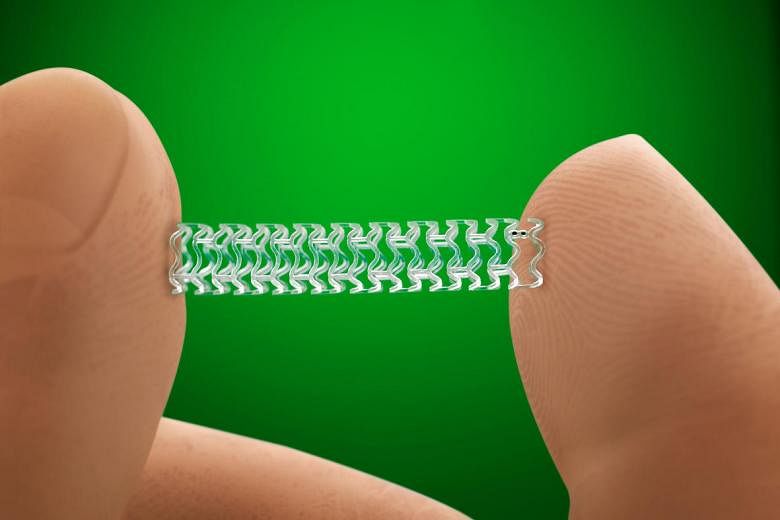At a top cancer meeting this month in Chicago, British researchers shared the result of a trial from 2009 to 2013 of 250 patients with colorectal cancer that had blocked their intestines, preventing bowel movement.
Half of them had stents to open the intestinal passage before a planned surgery and the other half had the traditional emergency surgery to remove the tumour.
The researchers from Cancer Research UK said the risk of death was 12 per cent for those who underwent emergency surgery and 2 per cent for those who had planned surgery. These are the general figures for emergency colorectal surgery, not specific to this trial.
Some doctors had feared that pushing a stent through the tumour could disperse the cancer cells or cause other damage. The trial showed survival was unaffected and quality of life improved.
The procedure to insert a stent to allow stool to pass has been practised in several hospitals here for about a decade.

Dr Ng Chee Yung, a senior colorectal surgeon at the Singapore General Hospital, said he does 10 to 15 cases a year. Often, patients with advanced colorectal cancer find out about it when they go to a hospital's emergency department because of prolonged constipation and a bloated stomach.
Colorectal is the top cancer here, affecting about 1,900 people a year. Many discover it at the late stages since there is usually no pain in the early stages. Symptoms include prolonged diarrhoea or constipation, and abdominal discomfort or pain. By then, the tumour is so big that it has completely blocked the big intestine, preventing stool from passing. The bloating comes from an accumulation of faeces and a build-up of gas that can expand the intestine to more than double its size.
This bloating makes the intestines "unhealthy" and prone to tearing easily. After the tumour is cut off, it could be difficult to sew up the intestine properly. A slight tear could result in faeces leaking out and causing infection that could be fatal.
Traditional treatment is for immediate surgery to remove the tumour. But if the intestine is unhealthy, the doctor would create a hole in the abdominal wall to which the upper portion of the intestine is linked, so that stool can pass out through the hole.
The procedure, called a colostomy, can be reversed and the hole closed once the intestines become healthier.
Describing the procedure, Dr Ng said a thin wire is passed through the tumour. Although the tumour might totally block the passage, there is always an opening, he said, since the tumour growing from opposite sides of the intestinal wall might press against each other, they do not stick.
A collapsed stent, a tubular wire mesh 3mm thick, is pulled through by the wire. When the covering is removed, it expands over 48 hours to about 2.5cm in diameter, pushing the tumour aside and leaving a hole for the stool to go through.
Once unblocked and the gases are released, the intestine reverts to its normal size. Surgery to remove the tumour is often done one to two weeks later, giving the intestine time to regain health.
The stents, which are 6cm to 12cm long and cost $1,800 to $2,000, are removed with the tumours, and the healthy intestine is rejoined. Using a stent to unblock the intestine means a colostomy is not needed.
Dr Cheong Wai Kit, a senior cancer surgeon at the National University Cancer Institute, said two in three patients could have their tumours removed with minimally invasive surgery after successful stenting.
As a result, he said, they enjoy "faster recovery, earlier mobilisation and feeding, and shorter hospitalisation" without affecting their cancer outcomes.
The stent is also used for patients with terminal colorectal cancer as a palliative procedure, so they can live as normal a life as possible for the time they have left.


